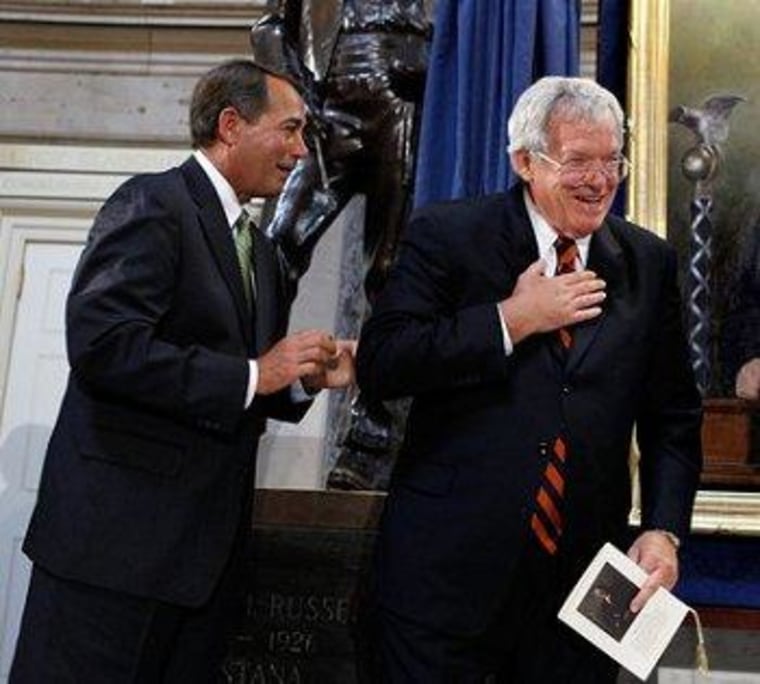I've kept a close eye on the non-binding "Hastert Rule" because as best as I can tell, its fate will help dictate what gets done in Congress between now and 2015. And at this point, it seems the only certainty is that nothing is certain.
To briefly recap, the "Hastert Rule" is terrific for party discipline and partisan rule -- it tells Republican Speakers to only bring bills to the floor that most of their own caucus supports (measures that enjoy a "majority of the majority"). The idea is, Republicans shouldn't even consider bills if they're dependent on Democratic votes to pass; the real power belongs in the hands of the House GOP's far-right rank and file.
In early January, House Speaker John Boehner (R-Ohio) decided to ignore the "rule" to pass a bipartisan agreement resolving the "fiscal cliff." At the time, Boehner said it was an unusual situation and he wouldn't make a habit of it. Two weeks later, however, the Speaker did it again on Sandy disaster relief, and again he said these were unique circumstances.
And last week, Boehner did it again to pass the Violence Against Women Act, raising questions anew.
Speaker John A. Boehner sought to assure his conference on Tuesday that the "Hastert rule" is still regular practice, on the heels of breaking it for the third time this Congress. [...]At a closed-door conference meeting Tuesday, Rep. Lynn Westmoreland of Georgia asked Boehner whether he planned to keep bringing forward bills that split the GOP conference. Boehner told reporters after the meeting that the VAWA vote was an outlier and said he would like to abide by the Hastert rule.
The Speaker specifically explained yesterday that sidestepping the "rule" is "not a practice that I would expect to continue long term."
Perhaps not, but Boehner's expectations notwithstanding, he's said this before.
I realize this probably seems like the ultimate in inside baseball -- discussing a non-binding, informal rule about which bills Republican House Speakers bring to the floor isn't exactly the sexiest of topics -- but it actually matters.
Ramesh Ponnuru, a prominent conservative writer, noted last week:
If most House Republicans feel strong pressure to pass a bill on some topic, but 20 or so Republicans refuse to vote for relatively conservative versions of those bills, then we will end up with more liberal policy outcomes. Those Republicans will, however, end up with voting records that more closely reflect their views of what public policy would be in an ideal world. And the Hastert rule will routinely be violated because it's unworkable.
Also note, John Feehery, a former spokesperson and leading aide in Hastert's office, also published a piece recently arguing that Boehner can't stick to the rule if he expects to govern.
I think John Boehner won't have much of a choice in these first several months of the 113th Congress. He has to get stuff done. He had to schedule the vote on the tax vote extension. He had to schedule a vote on Sandy relief if he was going to maintain any credibility for the GOP majority. And he will have to extend the debt limit. [...]The Speaker doesn't have much room to maneuver. His conference is in no mood to compromise, nor in much of a mood to vote for anything that resembles responsible governance.But as Speaker of the whole House, he has no choice but to schedule things that keep this country from defaulting on its debts and stay open.The Hastert rule worked pretty well for Denny Hastert, but for the next couple of years, John Boehner might have to think more like Tip O'Neill if he wants to survive with his reputation intact.
As we've discussed, if Boehner, in the name of getting stuff done, is open to bringing important bills to the floor, and passing legislation even when most of his own members disapprove, the next two years will be far less ridiculous than the last two. If we've seen the last of the exceptions, and the integrity of the "Hastert Rule" will now be restored, very little, if any, meaningful legislation will pass over the next 21 months.
